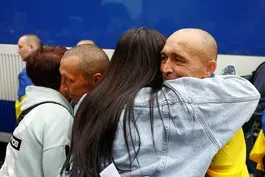
How proposed Medicaid cuts could affect family caregivers
Clip: 5/24/2025 | 4m 59sVideo has Closed Captions
How the GOP’s proposed Medicaid cuts could affect millions of family caregivers
House Republicans narrowly passed the multitrillion-dollar bill advancing Trump’s domestic agenda, and Senate Republicans are preparing for the battles ahead when they consider the measure next month. One item that’s sure to be debated is the House bill’s massive cuts to Medicaid. Jason Resendez of the National Alliance for Caregiving joins John Yang to discuss what those cuts could mean.
Problems with Closed Captions? Closed Captioning Feedback
Problems with Closed Captions? Closed Captioning Feedback
Major corporate funding for the PBS News Hour is provided by BDO, BNSF, Consumer Cellular, American Cruise Lines, and Raymond James. Funding for the PBS NewsHour Weekend is provided by...

How proposed Medicaid cuts could affect family caregivers
Clip: 5/24/2025 | 4m 59sVideo has Closed Captions
House Republicans narrowly passed the multitrillion-dollar bill advancing Trump’s domestic agenda, and Senate Republicans are preparing for the battles ahead when they consider the measure next month. One item that’s sure to be debated is the House bill’s massive cuts to Medicaid. Jason Resendez of the National Alliance for Caregiving joins John Yang to discuss what those cuts could mean.
Problems with Closed Captions? Closed Captioning Feedback
How to Watch PBS News Hour
PBS News Hour is available to stream on pbs.org and the free PBS App, available on iPhone, Apple TV, Android TV, Android smartphones, Amazon Fire TV, Amazon Fire Tablet, Roku, Samsung Smart TV, and Vizio.
Providing Support for PBS.org
Learn Moreabout PBS online sponsorshipJOHN YANG: Good evening.
I'm John Yang.
As Congress's Memorial Day recess gets underway, House Republicans are catching their breaths after narrowly passing the multitrillion dollar bill advancing President Trump's domestic agenda.
And Senate Republicans are preparing for the battles ahead when they consider the measure next month.
One item that's sure to be debated in the Senate is The House bill's $700 billion in savings in Medicaid, the nation's biggest health insurance program, especially the strict work requirement.
Jason Resendez is the president and CEO of the National Alliance for Caregiving, a coalition of organizations that advocates for the estimated 53 million Americans who serve as caregivers for loved ones.
Jason, I think people think of Medicaid, they think of people going to the doctor.
But explain to us how it benefits or how the family caregivers are supported by this.
JASON RESENDEZ, CEO, National Alliance for Caregiving: Absolutely.
Medicaid is a lifeline for millions of family caregivers who provide ongoing demanding care for aging Americans, people with disabilities or people with a serious illness.
Medicaid is a primary payer for home and community based services like transportation, meal support in home care assistance.
These are services that enable families and family caregivers to keep people with those serious illnesses like Alzheimer's and cancer or with disabilities in the home and in communities instead of having to opt into more costly institutionalized care.
JOHN YANG: And so how would what's in the House bill affect that?
JASON RESENDEZ: The House bill, if enacted, would reshape how care is provided in this country in a couple of key ways.
One, it'll force states to make decisions about its Medicaid program and what to fund because of reduced funding.
Usually historically, what is first on the chopping block are those home and community based services.
So it'll be harder to access those essential home and community based services.
Second is work requirements.
Really strict work requirements would add a really steep administrative burden onto the shoulders of family caregivers.
Family caregivers who are already navigating really complicated bureaucracy.
And then third will be a loss of health care coverage.
The Congressional Budget Office estimates that 14 million folks will lose health care coverage.
We know that over 4 million Americans are family caregivers who rely on Medicaid for their own health care coverage.
So that's at stake.
JOHN YANG: And the additional burden on caregivers because of the work requirement is they have to report what they're that they are working and certified that they are working.
Work requirements are popular with the American people.
There was a recent KFF poll that found that 62 percent of those questions said they supported work requirements.
What do you say to that?
JASON RESENDEZ: I say work requirements simply don't work.
We see that in places like Georgia and Arkansas where we're spending more on administrative costs and actually providing care.
When it comes to the work requirements in the House pass bill, we know that it'll set up really dangerous situation where family caregivers are forced to navigate really strictly and burdensome paperwork on top of the paperwork they're already navigating alongside providing daily care.
So really risking them losing coverage and the people that they're caring for receiving worse care.
JOHN YANG: During the House debate this past week, the House Republicans said that this was a matter for getting rid of waste, fraud and abuse.
Speaker Johnson said it's to return the dignity of work.
What do you say to that?
RESENDEZ: When we actually look at the data of Medicaid recipients who aren't working, what we see is that the majority aren't working because of medical conditions, because of old age, because of disabilities, or because they're providing care.
To say that these Medicaid work requirements are about getting to fraud, waste and abuse is assuming that these folks are out to game the system when that's far from the case.
So Speaker Johnson and the GOP is really out of step with what's planning playing out in American communities and families across the country.
JOHN YANG: Next up is the Senate.
And it's not just moderates like Senators Murkowski and Collins who don't like some of these cuts.
You've got a conservative like Senator Josh Hawley in Missouri who says these cuts go too deep.
What do you think is going to happen in the Senate?
JASON RESENDEZ: What we're hoping is that folks like Josh Hawley continue to champion the importance of Medicaid for supporting American families, for supporting the health and wellness of American families, and that senators like Susan Collins and Shelley Moore Capito, senators who have a personal connection to caregiving, keep that in mind as they determine the fate of this really drastic bill that would reshape how care is provided in this country.
JOHN YANG: Jason Resendez, thank you very much.
JASON RESENDEZ: Thanks for having me.
Do soda taxes improve health? What some cities have found
Video has Closed Captions
Clip: 5/24/2025 | 9m 41s | Does taxing sugary drinks result in better health outcomes? What some cities have found (9m 41s)
Link found between pre-teen social media use and depression
Video has Closed Captions
Clip: 5/24/2025 | 5m 5s | New study finds link between pre-teen use of social media and depression (5m 5s)
News Wrap: Ukraine and Russia exchange hundreds of POWs
Video has Closed Captions
Clip: 5/24/2025 | 3m 9s | News Wrap: Ukraine and Russia exchange hundreds of POWs (3m 9s)
Providing Support for PBS.org
Learn Moreabout PBS online sponsorshipSupport for PBS provided by:
Major corporate funding for the PBS News Hour is provided by BDO, BNSF, Consumer Cellular, American Cruise Lines, and Raymond James. Funding for the PBS NewsHour Weekend is provided by...














